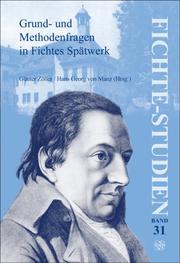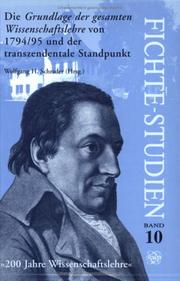| Listing 1 - 10 of 15 | << page >> |
Sort by
|
Book

ISBN: 384741190X 3847405594 Year: 2017 Publisher: Leverkusen Verlag Barbara Budrich
Abstract | Keywords | Export | Availability | Bookmark
 Loading...
Loading...Choose an application
- Reference Manager
- EndNote
- RefWorks (Direct export to RefWorks)
Scientific contributions authored by distinguished experts from the field of early education are published periodically within the framework of the series Scientific Studies on the Work of the "Haus der kleinen Forscher" Foundation. This publication series serves to foster informed dialogue between the Foundation, scientists, and practitioners with the aim of giving all early childhood education and care centres, after-school centres, and primary schools in Germany scientifically sound support in fulfilling their early education mandate. This fifth volume in the series focuses on goals of science education at the level of the children, the early childhood professionals, and the pedagogical staff at after-school centres and primary schools, and on process-related quality criteria for science teaching at pre-primary and primary level. In their expert reports, Yvonne Anders, Ilonca Hardy, Sabina Pauen, Beate Sodian, and Mirjam Steffensky specify pedagogical content dimensions of the goals of early science education at pre-primary and primary school age. In addition to theoretically underpinning these goals, the authors present instruments for their assessment. In his expert report, Jörg Ramseger formulates ten quality criteria for science teaching. Early childhood professionals and pedagogical staff at after-school centres and primary schools can draw on these process-related criteria when planning lessons and conducting self-evaluations of science learning opportunities at pre-primary and primary level. The concluding chapter of the volume describes the implementation of these expert recommendations in the substantive offerings of, and the accompanying research on, the "Haus der kleinen Forscher" Foundation.
Periodical
ISSN: 25262149
Abstract | Keywords | Export | Availability | Bookmark
 Loading...
Loading...Choose an application
- Reference Manager
- EndNote
- RefWorks (Direct export to RefWorks)
teaching --- learning --- research --- Education --- Research --- Research. --- Educational research --- education --- mathematics education --- science teaching
Periodical
ISSN: 25258923
Abstract | Keywords | Export | Availability | Bookmark
 Loading...
Loading...Choose an application
- Reference Manager
- EndNote
- RefWorks (Direct export to RefWorks)
science teaching --- science education --- mathematic teaching --- physics teaching --- biology teaching --- Science --- Biology --- Physics --- Chemistry --- Mathematics

ISSN: 09250166 ISBN: 9789042022935 904202044X 9789042020443 9789042020450 9789042020955 9789042021143 9789042026421 9042020458 9042021144 9789004456525 9401203679 1429481153 900445652X 9781429481151 Year: 2006 Volume: 28-32 Publisher: Amsterdam New York, NY Rodopi
Abstract | Keywords | Export | Availability | Bookmark
 Loading...
Loading...Choose an application
- Reference Manager
- EndNote
- RefWorks (Direct export to RefWorks)
Beiträge zum Fünften Internationalen Fichte-Kongreß »Johann Gottlieb Fichte. Das Spätwerk (1810-1814) und das Lebenswerk« in München vom 14. bis 21 Oktober 2003. Teil III.
Fichte, Johann Gottlieb, --- Conferences - Meetings --- Philosophy --- Science teaching --- Mental philosophy --- Humanities --- German idealism. --- German idealism --- Philosophy, German

ISSN: 09250166 ISBN: 9042001860 9004456414 9789042001862 9789004456419 Year: 1997 Volume: 10 Publisher: Leiden; Boston : BRILL
Abstract | Keywords | Export | Availability | Bookmark
 Loading...
Loading...Choose an application
- Reference Manager
- EndNote
- RefWorks (Direct export to RefWorks)
Periodical
ISSN: 14152150 19832117
Abstract | Keywords | Export | Availability | Bookmark
 Loading...
Loading...Choose an application
- Reference Manager
- EndNote
- RefWorks (Direct export to RefWorks)
Life Sciences --- General and Others --- science education --- science teaching --- science learning --- Science --- Science education --- Scientific education --- Study and teaching --- Study and teaching.
Periodical
ISSN: 15188795 15189384 Year: 1996 Publisher: Porto Alegre, Brasil Instituto de Física, Universidade Federal do Rio Grande do Sul
Abstract | Keywords | Export | Availability | Bookmark
 Loading...
Loading...Choose an application
- Reference Manager
- EndNote
- RefWorks (Direct export to RefWorks)
Science --- Sciences --- Study and teaching --- Periodicals. --- Etude et enseignement --- Périodiques --- Study and teaching. --- Science education --- Scientific education --- science education --- science teaching --- science learning --- research in science education --- Life Sciences --- General and Others
Periodical
ISSN: 23641177 Publisher: SpringerOpen
Abstract | Keywords | Export | Availability | Bookmark
 Loading...
Loading...Choose an application
- Reference Manager
- EndNote
- RefWorks (Direct export to RefWorks)
science teaching --- science learning --- teaching practice --- science curricula --- STEM education --- Science --- Study and teaching --- Study and teaching. --- Pacific Area. --- Science education --- Scientific education --- Natural science --- Science of science --- Sciences --- Asia-Pacific Region --- Asian and Pacific Council countries --- Asian-Pacific Region --- Pacific Ocean Region --- Pacific Region --- Pacific Rim --- Sciences - General --- Natural sciences --- stem education --- Teaching --- Étude et enseignement
Book
ISBN: 3110450542 3110450682 3110450550 Year: 2015 Publisher: De Gruyter
Abstract | Keywords | Export | Availability | Bookmark
 Loading...
Loading...Choose an application
- Reference Manager
- EndNote
- RefWorks (Direct export to RefWorks)
By 2020, half of the world's population and most university students will have a supercomputer in their pockets. This revolution will affect the way students respond to higher education. The university classroom must henceforth engage students, and the classic lecture format alone might not be enough to do so. This book answers the question how university students can learn in the classroom what they cannot learn in any other way. The answer is inspired by options that are not available to political scientists - in the way that they are in the laboratories for the sciences, in the performances for the live arts, and in the studios for visual arts - as well as ideas that are already present, but not widespread in the discipline: problem-solving and case studies, as in the professional schools, and simulation exercises in many other disciplines. This book proposes therefore an active pedagogy for political science, at a time when active pedagogy is more important than ever. Prof. Laure Paquette, PhD, has been a visiting researcher or professor in 23 countries. She has advised several foreign governments as well as her own, Canada, and has published extensively in four languages. This is her sixteenth book.
Political science --- Telecommunication in higher education. --- Study and teaching (Higher) --- Administration --- Civil government --- Commonwealth, The --- Government --- Political theory --- Political thought --- Politics --- Science, Political --- Education, Higher --- Social sciences --- State, The --- active pedagogy, political science, teaching and learning, university, higher education, case study, role-play.
Periodical
Abstract | Keywords | Export | Availability | Bookmark
 Loading...
Loading...Choose an application
- Reference Manager
- EndNote
- RefWorks (Direct export to RefWorks)
education --- teaching --- science and education --- science teaching --- formation of teachers --- Teaching --- Education --- Teaching. --- Education. --- Didactics --- Instruction --- Pedagogy --- School teaching --- Schoolteaching --- Instructional systems --- Pedagogical content knowledge --- Training --- Children --- Education of children --- Education, Primitive --- Human resource development --- Schooling --- Students --- Youth --- Civilization --- Learning and scholarship --- Mental discipline --- Schools
| Listing 1 - 10 of 15 | << page >> |
Sort by
|

 Search
Search Feedback
Feedback About UniCat
About UniCat  Help
Help News
News